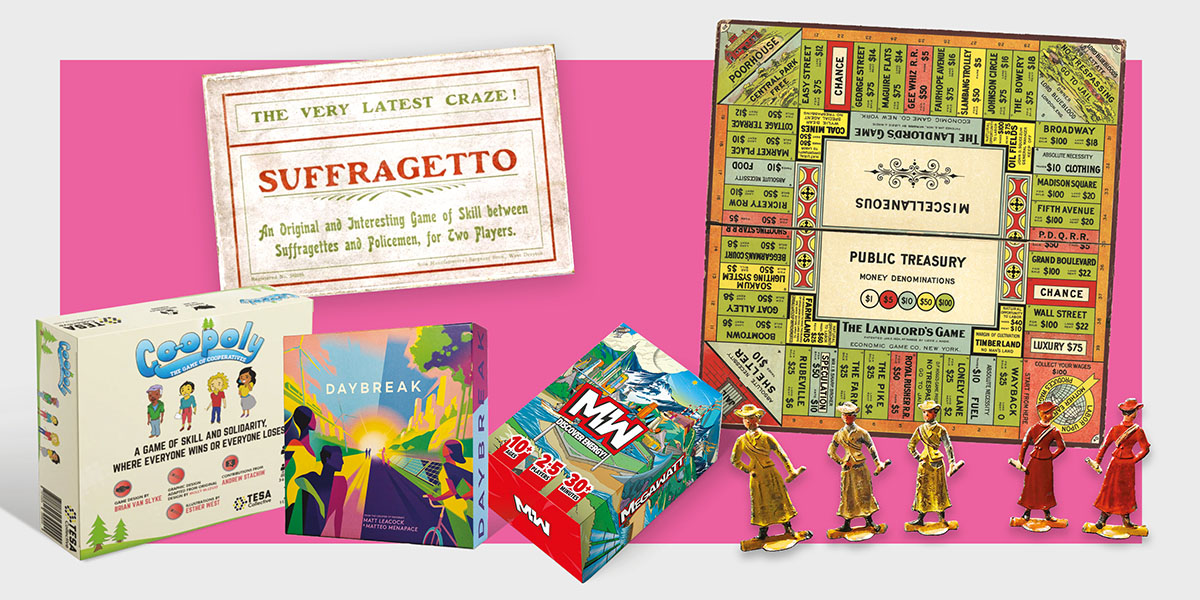The landlord’s game
By the end of the 20th century, Monopoly had been played by over 500 million people worldwide, outselling every game except checkers/draughts and chess. Original manufacturers Parker Brothers and current brand owners Hasbro claim it was invented by Charles Darrow during the Depression. Not so. The game now associated with rapacious capitalism was created in 1902 by socialist feminist Lizzie Magie as The Landlord’s Game.
She envisioned it as ‘a practical demonstration of the present system of land-grabbing with all its usual outcomes and consequences’. It was originally playable in two formats – the individualist version that became Monopoly, and a version where the aim was equitable distribution of wealth. By ‘[letting] children see clearly the gross injustice of our present land system,’ Magie predicted, ‘the evil will soon be remedied.’ Also, sadly, not so.
Bootleg copies of Magie’s board circulated until Darrow sold the idea as his own. His ‘rags to riches’ entrepreneurial tale became a key marketing line for the new ‘monopoly game’. Magie secured a settlement from Parker Brothers, but it refused to credit her. So does Hasbro, including when shamelessly launching 2019 spin-off Ms Monopoly, about ‘an advocate whose mission is to invest in female entrepreneurs’.
Unofficial riffs on the iconic game include Market Meltdown, in which players start off as millionaires rather than building empires from scratch. They zip around the board in private jets ‘battling’ interest rates, bonus caps, defaults and debts. Co-creator Will Sorrell wanted to ‘force players to behave in a way that led to the financial crisis’. Familiarity did not breed contempt: on its 2012 launch, sales soared in Kensington and Chelsea.
Co-opoly: The Game of Co-operatives, where players work together to start and sustain an organisation, offers hope that the socialist roots of Monopoly may yet pass Go. Launched in 2011 by worker-owned TESA (which also makes Space Cats Fight Fascism and Strike! The Game of Worker Rebellion), Co-opoly was ahead of its time. ‘Co-op games’ have become all the rage since Pandemic, in which players unite to halt a deadly virus spreading, shot up best-seller lists in 2020. Like The Landlord’s Game, it reflects real world concerns – and players’ desire to overcome them, together.
Feminist plays
The early 1900s Women’s Social and Political Union (WSPU) used games to raise funds, teach strategy and build awareness. Suffragetto pitched suffragettes against police – the former trying to storm the House of Commons, the latter to infiltrate the WSPU. Wrong moves put players in prison or hospital. The card game Panko, and Pank-a-Squith – named for Emmeline Pankhurst and prime minister Herbert Asquith – similarly promoted votes for women. Feminist activist-artists have also toyed with board games. Stella Dadzie made Womanopoly ‘for a society where the cards are stacked against women’.
Riffing on the 1960s hit The Game of Life, it uses game staples like ‘move x spaces forward’ and ‘miss a turn’ along gender lines, with pointed effect. Square eight, for example, reads: ‘Man: a new better job means you and your family move away from your wife’s job. Move forward four. Woman: give up work to start a family… back four.’ Dadzie encouraged players to gender swap for the game.
Jackie Collins and Pat Garrett’s Roots and Bootstraps: A Working Class Woman’s Journey Through Middle Class Feminism – a 1982 play on Snakes and Ladders – works to similar effect. Reviewing it in 2019, Peter Kirwan said: ‘The faux-educational tone patronises the working-class woman and punishes her for failing the “sisterhood” because of financial constraints… square 37 stood out: “Three days before your giro is due. Your friend wants you to go and see some feminist films with her. You tell her you’re skint, so she goes with someone else. Go back three spaces for organising your priorities badly, and not managing your dole money better.” The humour of the game’s admonishing tone barely conceals the [artists’] anger and hurt.’
Garrett commented: ‘Thatcher’s policies were really beginning to bite when we invented the game. We had planned more but funding for such work dried up. We still had a fairly well-functioning welfare state then, especially compared to now. Little did we know they were halcyon days.’
Climate games
In an era of impending climate collapse, new board games are helping players imagine creative solutions and better worlds. Created by Pandemic designer Matt Leacock with Matteo Menapace, 2023’s Daybreak makes players global superpowers tasked with reducing emissions, protecting life and building more just and resilient societies in the face of mounting crises. Cooperation is vital, as players win or lose collectively – after all, there’s only one world to save. Co-designer Menapace told the BBC World Service, ‘We didn’t want this to feel like you can win your way out of the climate crisis by switching the lights off… we want it to be about collective action and systemic change’.
Card game Megawatt tackles the science of energy more directly. Players compete to build the most energy-efficient power grid, balancing power with impact and dealing with unexpected events such as air quality control. It’s a tool for teaching about the impact of our need for power – and that we have a choice to switch from dirty to clean energy.
Inverting Mark Zuckerberg’s destructive mantra of ‘move fast and break things’, Move Quietly and Tend Things is a tabletop roleplayer game involving drawing and imagination, set in a post-climate collapse south-east Asia. Whereas Daybreak and Megawatt propose solutions to the climate crisis, it centres on continuing to care for the world and its societies even in the aftermath of destruction. On her motivation for creating the game, Kellynn Wee writes, ‘There’s a lot of beauty in the world and I will miss it if it is gone. This is a story from a post-climate collapse standpoint, about celebrating what we might have and grieving what we might lose.’ Download Move Quietly and Tend Things for free on Itch.io.










